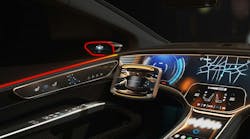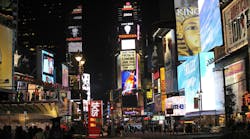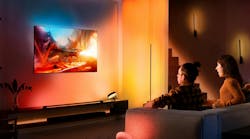For the fourth summer in a row, five undergraduate students spent eight weeks at the Lighting Research Center (LRC) at Rensselaer Polytechnic Institute learning about solid-state lighting and investigating technology and application issues. The LRC’s summer undergraduate research internship, sponsored by the Alliance for Solid-State Illumination Systems and Technologies (ASSIST), provides an opportunity for engineering, architecture, and science students to learn from LRC experts about research into the latest lighting technologies and controls.
Solid-state lighting (SSL), including LED and OLED technologies, their associated controls, and now their connection to the Internet of Things (IoT), is a quickly evolving market. SSL is already known to save energy, reduce costs, and provide flexible, innovative application and fixture designs. Through the LRC research internship, student interns get in-depth, hands-on experience with SSL and conduct short research projects on topics related to the direction that the technology is moving. During the eight weeks, students are busy with experiment design, apparatus and prototype building, and preparing a final presentation to the corporate sponsors of the ASSIST program.
“The ASSIST-sponsored internship is a great opportunity for students to receive mentorship in a research and career field that they may not be aware of, as well as a chance to present their work to organizations that may hire them in the future,” said Nadarajah Narendran, Ph.D., the LRC’s director of research and organizer of the ASSIST program and internship.
The research projects conducted this summer included developing a metric to assess stroboscopic flicker in LED lighting systems, evaluating the benefits of task lighting for load-shedding applications, and characterizing of thermal interface materials under thermal cycling. Also, in the area of connected lighting systems, two students investigated wireless methods for luminaire location mapping and real-time monitoring, and sensor communication protocol requirements for interfacing with real-time monitoring systems.
“Each year the student interns we hire stay busy and do an excellent job at getting up to speed, developing their projects, and presenting their research to the ASSIST sponsors in just a short amount of time, thanks to the intensive mentoring from LRC staff,” said Dr. Narendran.
Applications for the 2017 summer internship will be available next January. For more information, visit http://www.lrc.rpi.edu/education/SSLInternship/index.asp.
About ASSIST
The Alliance for Solid-State Illumination Systems and Technologies (ASSIST) was established in 2002 by the Lighting Research Center as a collaboration between researchers, manufacturers, and government organizations. ASSIST’s mission is to enable the broad adoption of solid-state lighting by providing factual information based on applied research and by visualizing future applications. The Lighting Research Center conducts research, demonstration, and educational activities on behalf of ASSIST. ASSIST is sponsored by Acuity Brands Lighting; Amerlux; BAE Systems; Bridgelux; Crouse-Hinds by Eaton; Current, powered by GE; Dow Corning; Federal Aviation Administration; Hubbell Lighting; Legrand; Lumens; Lumileds; New York State Energy Research and Development Authority (NYSERDA); Noveda Technologies; OSRAM SYLVANIA/OSRAM Opto Semiconductors; Philips Lighting; Seoul Semiconductor; United States Environmental Protection Agency. Visit www.lrc.rpi.edu/assist.
About the LRC
The Lighting Research Center (LRC) at Rensselaer Polytechnic Institute is the world's leading center for lighting research and education. Established in 1988 by the New York State Energy Research and Development Authority (NYSERDA), the LRC has been pioneering research in solid-state lighting, light and health, transportation lighting and safety, and energy efficiency for nearly 30 years. LRC lighting scientists with multidisciplinary expertise in research, technology, design, and human factors, collaborate with a global network of leading manufacturers and government agencies, developing innovative lighting solutions for projects that range from the Boeing 787 Dreamliner to U.S. Navy submarines to hospital neonatal intensive-care units. LRC researchers conduct independent, third-party testing of lighting products in the LRC's state of the art photometric laboratories, the only university lighting laboratories accredited by the National Voluntary Laboratory Accreditation Program (NVLAP Lab Code: 200480-0). In 1990, the LRC became the first university research center to offer graduate degrees in lighting and today, offers a M.S. in lighting and a Ph.D. to educate future leaders in lighting. With 35 full-time faculty and staff, 15 graduate students, and a 30,000 sq. ft. laboratory space, the LRC is the largest university-based lighting research and education organization in the world.
“The ASSIST-sponsored internship is a great opportunity for students to receive mentorship in a research and career field that they may not be aware of, as well as a chance to present their work to organizations that may hire them in the future,” said Nadarajah Narendran, Ph.D., the LRC’s director of research and organizer of the ASSIST program and internship.
The research projects conducted this summer included developing a metric to assess stroboscopic flicker in LED lighting systems, evaluating the benefits of task lighting for load-shedding applications, and characterizing of thermal interface materials under thermal cycling. Also, in the area of connected lighting systems, two students investigated wireless methods for luminaire location mapping and real-time monitoring, and sensor communication protocol requirements for interfacing with real-time monitoring systems.
“Each year the student interns we hire stay busy and do an excellent job at getting up to speed, developing their projects, and presenting their research to the ASSIST sponsors in just a short amount of time, thanks to the intensive mentoring from LRC staff,” said Dr. Narendran.
Applications for the 2017 summer internship will be available next January. For more information, visit http://www.lrc.rpi.edu/education/SSLInternship/index.asp.
About ASSIST
The Alliance for Solid-State Illumination Systems and Technologies (ASSIST) was established in 2002 by the Lighting Research Center as a collaboration between researchers, manufacturers, and government organizations. ASSIST’s mission is to enable the broad adoption of solid-state lighting by providing factual information based on applied research and by visualizing future applications. The Lighting Research Center conducts research, demonstration, and educational activities on behalf of ASSIST. ASSIST is sponsored by Acuity Brands Lighting; Amerlux; BAE Systems; Bridgelux; Crouse-Hinds by Eaton; Current, powered by GE; Dow Corning; Federal Aviation Administration; Hubbell Lighting; Legrand; Lumens; Lumileds; New York State Energy Research and Development Authority (NYSERDA); Noveda Technologies; OSRAM SYLVANIA/OSRAM Opto Semiconductors; Philips Lighting; Seoul Semiconductor; United States Environmental Protection Agency. Visit www.lrc.rpi.edu/assist.
About the LRC
The Lighting Research Center (LRC) at Rensselaer Polytechnic Institute is the world's leading center for lighting research and education. Established in 1988 by the New York State Energy Research and Development Authority (NYSERDA), the LRC has been pioneering research in solid-state lighting, light and health, transportation lighting and safety, and energy efficiency for nearly 30 years. LRC lighting scientists with multidisciplinary expertise in research, technology, design, and human factors, collaborate with a global network of leading manufacturers and government agencies, developing innovative lighting solutions for projects that range from the Boeing 787 Dreamliner to U.S. Navy submarines to hospital neonatal intensive-care units. LRC researchers conduct independent, third-party testing of lighting products in the LRC's state of the art photometric laboratories, the only university lighting laboratories accredited by the National Voluntary Laboratory Accreditation Program (NVLAP Lab Code: 200480-0). In 1990, the LRC became the first university research center to offer graduate degrees in lighting and today, offers a M.S. in lighting and a Ph.D. to educate future leaders in lighting. With 35 full-time faculty and staff, 15 graduate students, and a 30,000 sq. ft. laboratory space, the LRC is the largest university-based lighting research and education organization in the world.
Contact:
Rebekah Mullaney, Manager, Research Communications - Lighting Research Center, Rensselaer Polytechnic Institute+1 518.687.7118
E-mail:
[email protected]Locate more LED lighting vendors in the LEDs Magazine Suppliers Directory
Submit new products, case studies/projects, and other press releases at http://www.ledsmagazine.com/content/leds/en/addcontent.html.
More from Lighting Research Center:
Lighting Research Center investigates plug-and-play control-integrated, intelligent LED luminaires
Lighting Research Center issues response to AMA report on LED lighting
Submit new products, case studies/projects, and other press releases at http://www.ledsmagazine.com/content/leds/en/addcontent.html.
More from Lighting Research Center:
Lighting Research Center investigates plug-and-play control-integrated, intelligent LED luminaires
Lighting Research Center issues response to AMA report on LED lighting




